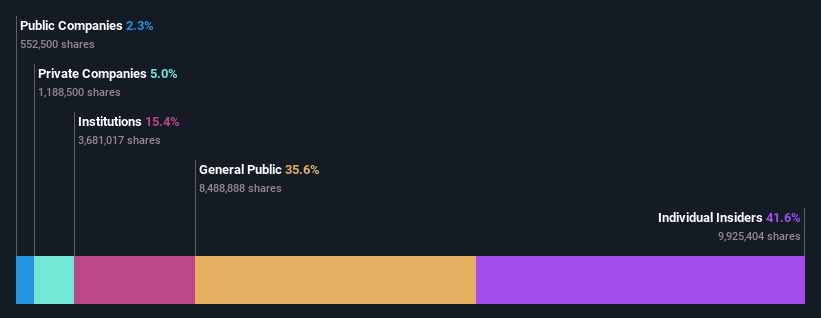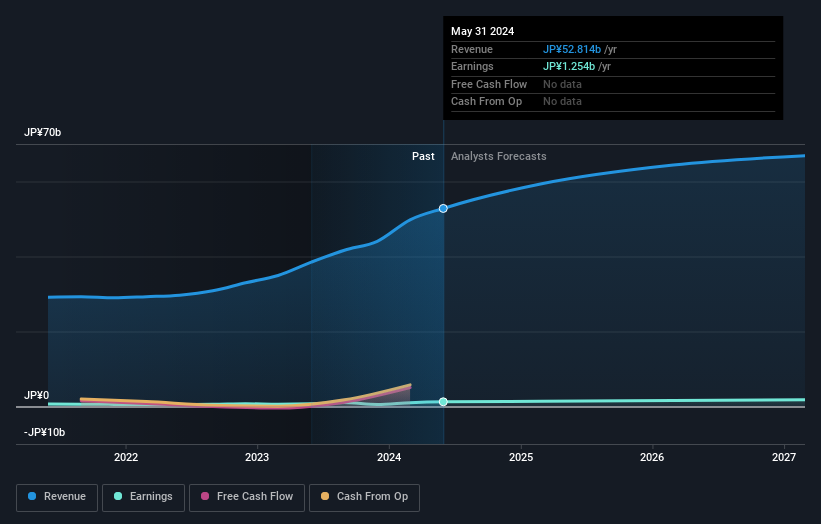Following recent decline, Yoshimura Food Holdings K.K.'s (TSE:2884) top shareholder CEO Motohisa Yoshimura sees holdings value drop by 15%

Key Insights
- Insiders appear to have a vested interest in Yoshimura Food Holdings K.K's growth, as seen by their sizeable ownership
- The top 4 shareholders own 52% of the company
- Institutions own 15% of Yoshimura Food Holdings K.K
If you want to know who really controls Yoshimura Food Holdings K.K. (TSE:2884), then you'll have to look at the makeup of its share registry. And the group that holds the biggest piece of the pie are individual insiders with 42% ownership. That is, the group stands to benefit the most if the stock rises (or lose the most if there is a downturn).
And last week, insiders endured the biggest losses as the stock fell by 15%.
In the chart below, we zoom in on the different ownership groups of Yoshimura Food Holdings K.K.
See our latest analysis for Yoshimura Food Holdings K.K

What Does The Institutional Ownership Tell Us About Yoshimura Food Holdings K.K?
Institutional investors commonly compare their own returns to the returns of a commonly followed index. So they generally do consider buying larger companies that are included in the relevant benchmark index.
Yoshimura Food Holdings K.K already has institutions on the share registry. Indeed, they own a respectable stake in the company. This implies the analysts working for those institutions have looked at the stock and they like it. But just like anyone else, they could be wrong. It is not uncommon to see a big share price drop if two large institutional investors try to sell out of a stock at the same time. So it is worth checking the past earnings trajectory of Yoshimura Food Holdings K.K, (below). Of course, keep in mind that there are other factors to consider, too.

We note that hedge funds don't have a meaningful investment in Yoshimura Food Holdings K.K. Looking at our data, we can see that the largest shareholder is the CEO Motohisa Yoshimura with 37% of shares outstanding. Meanwhile, the second and third largest shareholders, hold 5.0% and 5.0%, of the shares outstanding, respectively.
Our research also brought to light the fact that roughly 52% of the company is controlled by the top 4 shareholders suggesting that these owners wield significant influence on the business.
While studying institutional ownership for a company can add value to your research, it is also a good practice to research analyst recommendations to get a deeper understand of a stock's expected performance. There is some analyst coverage of the stock, but it could still become more well known, with time.
Insider Ownership Of Yoshimura Food Holdings K.K
The definition of company insiders can be subjective and does vary between jurisdictions. Our data reflects individual insiders, capturing board members at the very least. The company management answer to the board and the latter should represent the interests of shareholders. Notably, sometimes top-level managers are on the board themselves.
Insider ownership is positive when it signals leadership are thinking like the true owners of the company. However, high insider ownership can also give immense power to a small group within the company. This can be negative in some circumstances.
Our most recent data indicates that insiders own a reasonable proportion of Yoshimura Food Holdings K.K.. Insiders own JP¥13b worth of shares in the JP¥32b company. We would say this shows alignment with shareholders, but it is worth noting that the company is still quite small; some insiders may have founded the business. You can click here to see if those insiders have been buying or selling.
General Public Ownership
With a 36% ownership, the general public, mostly comprising of individual investors, have some degree of sway over Yoshimura Food Holdings K.K. While this group can't necessarily call the shots, it can certainly have a real influence on how the company is run.
Private Company Ownership
We can see that Private Companies own 5.0%, of the shares on issue. It might be worth looking deeper into this. If related parties, such as insiders, have an interest in one of these private companies, that should be disclosed in the annual report. Private companies may also have a strategic interest in the company.
Next Steps:
It's always worth thinking about the different groups who own shares in a company. But to understand Yoshimura Food Holdings K.K better, we need to consider many other factors. Case in point: We've spotted 3 warning signs for Yoshimura Food Holdings K.K you should be aware of, and 2 of them are a bit concerning.
If you would prefer discover what analysts are predicting in terms of future growth, do not miss this free report on analyst forecasts.
NB: Figures in this article are calculated using data from the last twelve months, which refer to the 12-month period ending on the last date of the month the financial statement is dated. This may not be consistent with full year annual report figures.
New: Manage All Your Stock Portfolios in One Place
We've created the ultimate portfolio companion for stock investors, and it's free.
• Connect an unlimited number of Portfolios and see your total in one currency
• Be alerted to new Warning Signs or Risks via email or mobile
• Track the Fair Value of your stocks
Have feedback on this article? Concerned about the content? Get in touch with us directly. Alternatively, email editorial-team (at) simplywallst.com.
This article by Simply Wall St is general in nature. We provide commentary based on historical data and analyst forecasts only using an unbiased methodology and our articles are not intended to be financial advice. It does not constitute a recommendation to buy or sell any stock, and does not take account of your objectives, or your financial situation. We aim to bring you long-term focused analysis driven by fundamental data. Note that our analysis may not factor in the latest price-sensitive company announcements or qualitative material. Simply Wall St has no position in any stocks mentioned.
About TSE:2884
Yoshimura Food Holdings K.K
Manufactures and sells food products in Japan.
Proven track record with moderate growth potential.

